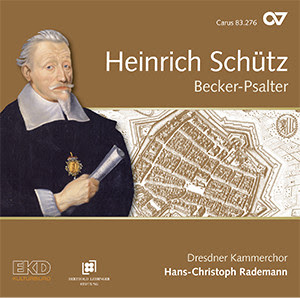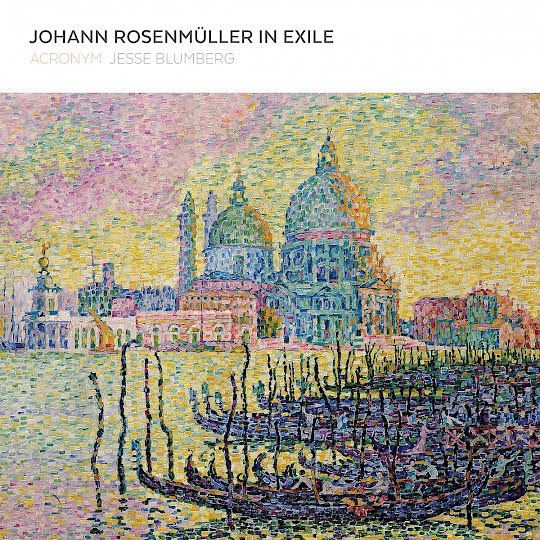Program: #17-43 Air Date: Oct 16, 2017
To listen to this show, you must first LOG IN. If you have already logged in, but you are still seeing this message, please SUBSCRIBE or UPGRADE your subscriber level today.
October 31st makes the actual date of the Reformation, and we conclude our year-long series with recordings that take us from Schutz to Bach.
I. Heinrich Schütz—Becker-Psalter (Dresden Kammerchor/Hans-Christoph Rademann). Carus CD 83.276.

From Amazon.com: I have been looking for a recording of the Becker Psalms for decades. These works are not lavishly scored concerti for antiphonal choirs and instruments, such as the Psalmen Davids of 1619. Rather they are versified Psalms intended for congregational singing. Hymns, basically; though their melodic and rhythmic patterns are distinctively Schützian--that is, lively, complex, and hauntingly beautiful. A judicious selection is presented here. corresponding with the particular Psalms set in the 1619 Psalmen Davids, an editorial decision that enables listeners to make some fascinating comparisons and contrasts between the two collections. Rademann scores successive strophes in various ways--full vocal ensemble and different solo voices, with continuo support and occasional instrumental doublings. He secures disciplined and expressive contributions from vocalists and instrumentalists, all well-versed in historically-informed performance practice. Since these works will be terra incognita for most listeners (though a few of the chorale tunes will be familiar from other sources--such as "Aus tiefer Noth, schrei ich zu Dir"), and since the only prior recording of which I am aware is an ancient Vox LP with the Gregg Smith Singers (not complete), this significant issue should be welcomed with thankful "hearts, hands, and voices." If you love the music of Schütz, or have an interest in the history of Protestant hymnody (an art form whose vanishing from church services is one of the great tragedies of our age), do not hesitate to obtain this superb recording.
1 Der Herr Sprach Zu Meim Herren (Psalm 110) SWV 208
2 Was Haben Doch Die Leut Im Sinn (Psalm 2) SWV 98
3 Ach Herr, Mein Gott, Straf Mich Doch Nicht (Psalm 6) SWV 102
4 Aus Tiefer Not Schrei Ich Zu Dir (Psalm 130) SWV 235
5 Es Ist Ein Freud Dem Herzen Mein (Psalm 122) SWV 227
6 Mit Dank Wir Sollen Loben (Psalm 8) SWV 104
7 Wer Nicht Sitzt Im Gottlosen Rat (Psalm 1) SWV 97
8 Wie Sehr Lieblich Und Schöne (Psalm 84) SWV 181
9 Wohl Dem, Der In Gottesfurcht Steht (Psalm 128) SWV 233
10 Ich Heb Mein Augen Sehnlich Auf (Psalm 121) SWV 226
11 Danket Dem Herren, Gebt Ihm Ehr (Psalm 136) SWV 241
12 Der Herr Ist Mein Getreuer Hirt (Psalm 23) SWV 120
13 Ich Will von Herzen Danken Gott Dem Herren (Psalm 111) SWV 209
14 Singet Dem Herrn Ein Neues Lied (Psalm 98) SWV 196
15 Jauchzet Dem Herren, Alle Welt (Psalm 100) SWV 198
16 An Wasserflüssen Babylon (Psalm 137) SWV 242
17 Nun Lob, Mein Seel, Den Herren (Psalm 103) SWV 201
18 Wenn Gott Einmal Erlösen Wird (Psalm 126) SWV 231
19 Nicht Uns, Nicht Uns, Herr, Lieber Gott (Psalm 115) SWV 213
20 Lobt Gott In Seinem Heiligtum (Psalm 150) SWV 255 & Responsorium SWV 256
II. Johann Rosenmüller in Exile (Acronym/Jesse Blumberg). Olde Focus CD FCR909.

Composer, trombonist, organist, and teacher Johann Rosenmüller was born and died in Germany but spent much of his life exiled in Italy. He began his education at the Lateinschule in Oelsnitz, the city of his birth, and he graduated from the University of Leipzig, where he studied music and theology and was later hired as a teacher. Rosenmüller was promoted at Leipzig’s Thomasschule by 1650, and he was appointed organist of the Nikolaikirche the following year. He published prolifically during this period, printing more compositions than any other composer in Leipzig. The city council assured Rosenmüller that he would be the next Thomaskantor—one of the most prominent posts in Germany, later held by J. S. Bach—but before the position became vacant, Rosenmüller’s career imploded due to his arrest with several schoolboys in 1655 after accusations of sodomy. Following his escape from prison, Rosenmüller eventually made his way to Venice, where in 1658 he found employment as a trombonist at San Marco. By 1660 he had achieved renown as a composer in Italy, teaching students such as Johann Philipp Krieger (whose Sonata a4 was featured on ACRONYM’s Wunderkammer recording). From 1678 to 1682, Rosenmüller held the position of composer at the Ospedale della Pietà, the orphanage and school that would employ Antonio Vivaldi several decades later.
The vast majority of Rosenmüller’s vocal music is sacred and sets German or Latin texts. He likely composed most of the Latin-texted works while in Venice, since they generally reflect Italian and Catholic liturgical practices and musical styles. Nevertheless, they survive largely in German manuscripts, because Rosenmüller sent many of these compositions to contacts in Germany, likely in attempts to secure employment. He modeled many of these works on the secular cantatas of Italian composers such as Carissimi and Cesti, incorporating Italian operatic and instrumental compositional elements. Rosenmüller begins each cantata included on this recording with a brief sonata followed by aria sections alternating with recitative, occasionally interspersed with instrumental ritornelli. These cantatas are found in Berlin in a manuscript collection (D-B Mus.ms. 18883) of thirty-five solo cantatas—most of them unique, unpublished and unrecorded—copied by many hands and compiled in 1700. The four cantata texts consist of Latin devotional prose and poetry. Their provenance is unknown, but they reflect the religious context of Rosenmüller’s Venetian residence and Leipzig education; although they are influenced by Catholic mysticism prevalent in Italy, their emphasis on Christ reveals a fundamental interest in the Lutheran orthodoxy dominant in much of Germany.
01
Domine cor meum in ardet impatiens
7:48
02
Sonate da Camera (1670): Sonata a5 #4 in G Minor
7:15
03
Aude quid times gens Christo dicata
7:20
04
Sonate da Camera (1670): Sonata a5 #8 in E Minor
6:52
05
Salve mi Jesu, Pater misericordiae
8:09
06
Sonate da Camera (1670): Sonata a5 #6 in A Minor
8:50
07
Ascendit invictissimus salvator
5:41
III. Reformation 1517-2017 (Choir of Clare College, Cambridge/Graham Ross). Harmonia Mundi CD HMM 902265.

In 1517, indignant at mercenary practices of the Catholic Church and convinced that a public debate was needed to restore faith in the founding texts of the Bible, Martin Luther nailed his 95 Theses to the door of the church in Wittenberg Castle. This marked the beginning of the Protestant Reformation, of which he was a seminal figure, which was to spread all over Europe.
Five hundred years later, in 2017, Graham Ross and the Choir of Clare College, Cambridge marked the anniversary with a series of cantatas by J. S. Bach performed liturgically in Clare College Chapel on the eight Sundays of Lent Term. This recording is the culmination of that project, presenting chronologically the two great Reformation cantatas of J. S. Bach and three chorale-based works by Mendelssohn, Brahms and Vaughan Williams, each preceded here by the chorale melody or hymn on ̀which they are based, giving an insight into the emotional and dramatic strength of the Reformation's theological and cultural legacy.
Bach, J S:
Cantata BWV79 'Gott der Herr ist Sonn und Schild'
Cantata BWV80 'Ein feste Burg ist unser Gott'
Brahms:
Warum ist das Licht gegeben? Op. 74 No. 1
Croft:
O God, our Help in Ages past
Cruger:
Now thank we all our God (Nun danket)
Luther:
Ein’ feste Burg ist unser Gott
Mit Freud und Freud ich fahr dahin
Mendelssohn:
Wer nur den lieben Gott lasst walten
Neumark:
Wer nur den lieben Gott lässt walten
Vaughan Williams:
Lord, Thou has been our refuge
Holly Holt (soprano), Catherine Clark (mezzo-soprano), Jackson Riley (tenor), Christopher Holliday (bass), Paul Sharp (trumpet), Nicholas Morris (organ)
Composer Info
Heinrich Schütz, Johann Rosenmüller, J.S. Bach, Brahms, Croft, Cruger, Luther, Mendelssohn, Neumark, Vaughan Williams,
CD Info
Carus CD 83.276, CD FCR909, CD HMM 902265.